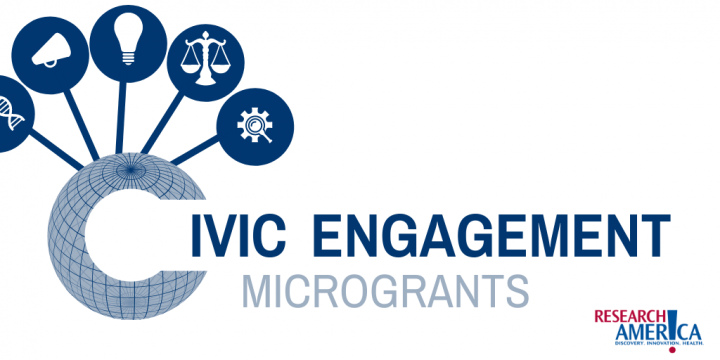Research!America Awards 21 Microgrants to Support Civic Engagement of Early Career Scientists

Research!America is excited to announce the recipients of the 2024 Civic Engagement Microgrant Program. With awards of up to $4,000 each, these 21 graduate student- and post doc-led groups in Science, Technology, Engineering, Math, and Medicine (STEMM) fields from across the country, will work with public officials, local community leaders, and community members around issues of common concern.
Since 2018, the Civic Engagement Microgrant Program has supported early career scientists with resources and funding to build dialogue with public officials and community leaders while developing skills in program planning, communications, and a working knowledge of policy and government to become effective ambassadors of science. Research!America is grateful to the Rita Allen Foundation for its generous support of the awards.
“Early career scientists are uniquely positioned to build trust in science and break down the walls that separate scientists from others in the community,” said Mary Woolley, President and CEO of Research!America. “Engaging the community also makes science better by assuring responsiveness to the lived experience and aspirations of those who will benefit. We are grateful for the long-standing support from the Rita Allen Foundation and are excited to see the innovative ideas brought forth by this year’s micrograntees.”
The Rita Allen Foundation, which invests in innovative approaches to strengthening civic engagement, has provided funding for this initiative for six years. Additional support was received from the Chalk Talk Science Project. Special funding was received from the Alfred P. Sloan Foundation for work related to Building Equity in the Research!America Microgrant Program.
“Fostering connections between scientists and their communities through Research!America’s Civic Engagement Microgrant Initiative facilitates vital conversations that strengthen the relationship between science and society,” said Elizabeth Good Christopherson, President and CEO of the Rita Allen Foundation. “Early-career scientists are building skills to cultivate these necessary relationships to address today’s complex issues.”
Research!America microgrants were awarded to the following graduate student groups:
- OSU Veterinary Public Health Club – Ohio State University
- Neuroscience Community Outreach Group – University of Washington (UW)
- Mentorship Opportunities for Research Engagement (MORE) – Northwestern University
- Science Policy Network Detroit – Wayne State University
- UofL Research Communications Group – University of Louisville
- Black Scientist Collective – Baylor College of Medicine
- IMPACT Indiana – Indiana University School of Medicine; Indiana Alzheimer’s Disease Research Center Outreach, Recruitment, and Engagement Core (IADRC OREC)
- NYUGSOM-SciPol – New York University Grossman School of Medicine
- Stars Over Streetlights – The Regents of the University of California, Santa Cruz
- Science Unlocked – The Petey Greene Program, Washington, D.C.
- Kentucky Advocates for Science Policy and Research (KASPR, University of Kentucky)/Science Policy & Outreach Group (SPOG, University of Louisville) – University of Kentucky Research Foundation
- American Physician Scientists Association – Stony Brook University Local Chapter Policy Working Group – Stony Brook University
- Landscape Ecology and Sustainability Lab – Arizona State University
- ComSciCon Houston – Rice University and ComSciCon
- Science Policy Group at UCLA – UCLA
- Community Overdose Response and Recovery Effort (CORRE) – The University of Texas Medical Branch
- Innovative Collaboratory for Advancing Research with the Underserved and Stigmatized (iCARUS) – Florida International University
- Cal Poly Pomona – ‘Huron the Beautiful’ – Cal Poly Pomona
- Knowing Neurons podcast
- NSPN Science Diplomacy Committee – National Science Policy Network
- West Virginia Local Science Engagement Network – West Virginia University
Examples of projects include:
- Lighting Up Minds, Dimming the Skies will give talks at elementary schools in Santa Cruz County, CA, to introduce concepts of light pollution, its effects on humans and its connection to astronomy.
- The Kentucky Advocates for Science Policy and Research will host a research symposium at the Kentucky state capital called “Building Bridges Symposium: Fostering Understanding Between Lawmakers and the Scientific Community in Kentucky.”
- The Black Scientist Collective at Baylor College of Medicine will host a health literacy fair tackling disparities within maternal health, chronic illness, and infectious diseases.
- Science Unlocked based in Washington, D.C., will engage incarcerated youth in science by developing and hosting hands-on science experiments as part of the youth’s regular education curriculum.




